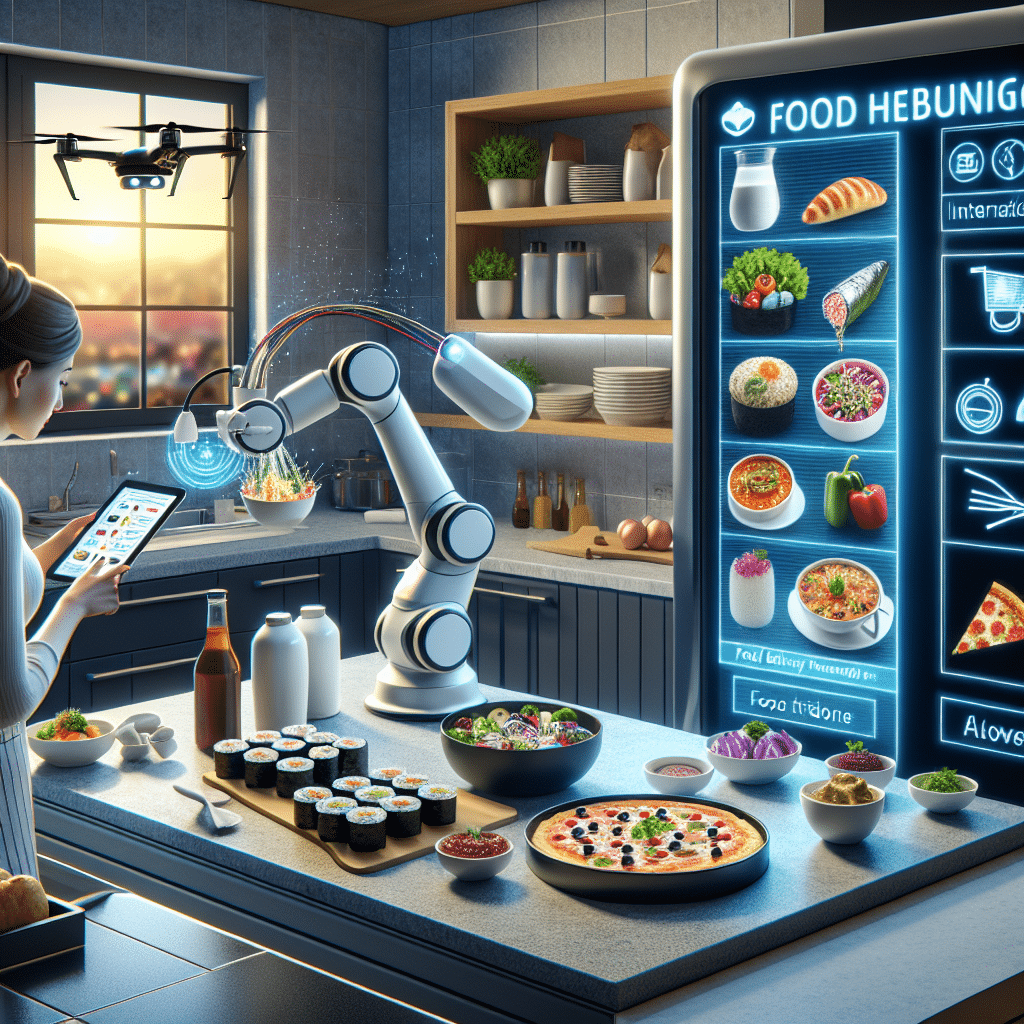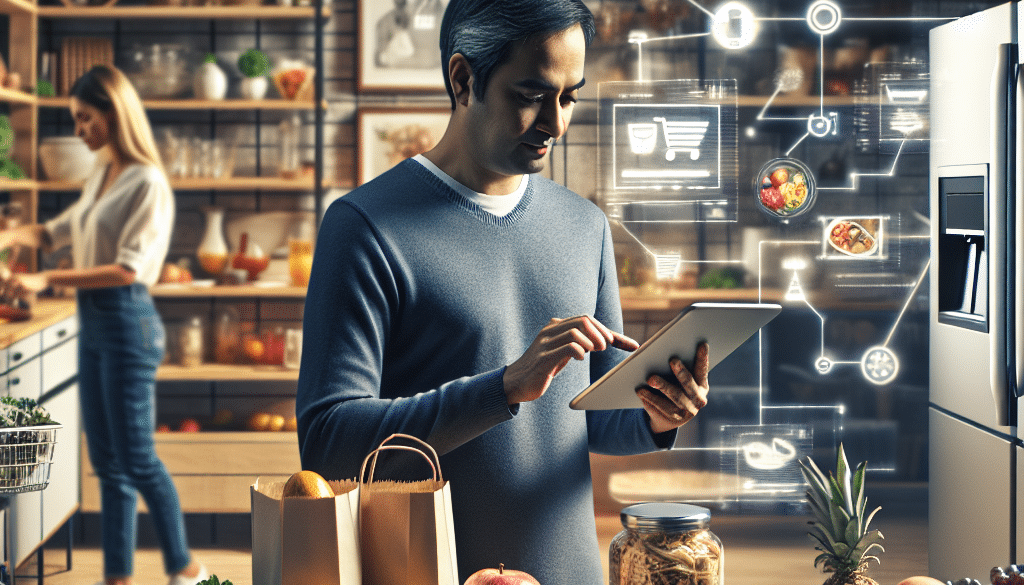Food, Technology and the Always-on Consumer
-
Table of Contents
- Food Technology and the Always-On Consumer: Innovations Shaping the Future
- The Rise of the Always-On Consumer
- Technological Innovations in Food Production
- Smart Food Shopping and Personalization
- Food Delivery and the On-Demand Economy
- Case Studies: Technology in Action
- Conclusion: Embracing the Future of Food and Technology
- ETChem: Meeting the Protein Needs of the Modern Consumer
Food Technology and the Always-On Consumer: Innovations Shaping the Future

The landscape of food consumption is undergoing a radical transformation, driven by the relentless pace of technological innovation and the emergence of the ‘always-on’ consumer. This new breed of consumers is characterized by their constant connectivity, demand for convenience, and desire for instant gratification. As a result, the food industry is adapting to meet these evolving needs through the integration of cutting-edge technologies. This article explores how technology is reshaping the way we produce, purchase, and experience food, and the implications for consumers and businesses alike.
The Rise of the Always-On Consumer
The term ‘always-on’ refers to consumers who are perpetually connected to the internet, often through multiple devices, and expect to access services and products at any time. This shift in consumer behavior has significant implications for the food industry:
- Increased demand for 24/7 food delivery services
- Expectation for real-time tracking of food orders
- Preference for personalized food recommendations
- Desire for seamless and rapid transaction processes
These trends are pushing food businesses to innovate and adopt new technologies to stay competitive and cater to the high expectations of modern consumers.
Technological Innovations in Food Production
Technology is revolutionizing food production, making it more efficient, sustainable, and responsive to consumer demands. Here are some key areas where technology is making an impact:
- Vertical Farming: This method uses controlled environments to grow crops in vertically stacked layers, optimizing space and resources. It allows for year-round production, reducing the need for transportation and associated emissions.
- Lab-grown Meat: Cultured meat, grown in a lab from animal cells, offers a potential solution to the environmental and ethical concerns associated with traditional livestock farming.
- Genetic Editing: CRISPR and other gene-editing tools enable the development of crops with improved yield, nutritional value, and resistance to pests and diseases.
These advancements are not only making food production more sustainable but also enabling the creation of novel food products tailored to consumer preferences.
Smart Food Shopping and Personalization
Technology is transforming the way consumers shop for food, with a focus on convenience and personalization:
- Online Grocery Shopping: E-commerce platforms and apps allow consumers to shop for groceries anytime, anywhere, with the added convenience of home delivery or curbside pickup.
- Personalized Nutrition: AI-powered apps analyze dietary preferences and health goals to provide personalized food recommendations and meal plans.
- Smart Kitchen Appliances: Internet-connected devices like smart refrigerators can track inventory, suggest recipes based on available ingredients, and even order groceries automatically.
These innovations are catering to the always-on consumer’s need for personalized, hassle-free food shopping experiences.
Food Delivery and the On-Demand Economy
The on-demand economy has taken the food industry by storm, with food delivery services experiencing explosive growth. Key factors contributing to this trend include:
- Integration of advanced logistics and real-time tracking technologies
- Partnerships between restaurants and delivery platforms
- Use of drones and autonomous vehicles for faster, more efficient delivery
As a result, consumers can enjoy a wider variety of food options delivered to their doorstep with unprecedented speed and convenience.
Case Studies: Technology in Action
Several companies are leading the way in integrating technology into the food experience:
- Amazon Go: Amazon’s cashierless stores use sensors and AI to track purchases, allowing customers to simply walk out with their items, which are automatically charged to their Amazon account.
- Domino’s Pizza: Domino’s has embraced technology with features like GPS delivery tracking, AI-powered chatbots for ordering, and even experimenting with robot deliveries.
- Blue Apron: This meal kit service uses data analytics to predict consumer preferences and manage its supply chain efficiently, reducing food waste and offering tailored meal options.
These examples demonstrate the potential of technology to enhance the food shopping and consumption experience for the always-on consumer.
Conclusion: Embracing the Future of Food and Technology
The intersection of food, technology, and the always-on consumer is creating a dynamic and rapidly evolving landscape. Businesses that embrace these changes and invest in technological innovations will be well-positioned to meet the demands of modern consumers. From sustainable food production to personalized shopping experiences and on-demand delivery, technology is enabling a more convenient, efficient, and enjoyable food ecosystem.
For companies like ETChem, these trends present an opportunity to showcase their high-quality protein products to a global audience. With a focus on sustainability, convenience, and nutrition, ETChem’s offerings are well-suited to the needs of the always-on consumer.
ETChem: Meeting the Protein Needs of the Modern Consumer
ETChem’s range of collagen products, including marine, fish, bovine, and chicken collagen, caters to the health-conscious consumer looking for premium protein supplements. Their commitment to quality, instant solubility, and neutral taste makes their products ideal for incorporation into a variety of food and beverage applications.
As the food industry continues to evolve, ETChem’s expertise in providing tailor-made collagen solutions positions them as a valuable partner for businesses seeking to innovate and cater to the always-on consumer.
About ETChem:
ETChem, a reputable Chinese Collagen factory manufacturer and supplier, is renowned for producing, stocking, exporting, and delivering the highest quality collagens. They include marine collagen, fish collagen, bovine collagen, chicken collagen, type I collagen, type II collagen and type III collagen etc. Their offerings, characterized by a neutral taste, instant solubility attributes, cater to a diverse range of industries. They serve nutraceutical, pharmaceutical, cosmeceutical, veterinary, as well as food and beverage finished product distributors, traders, and manufacturers across Europe, USA, Canada, Australia, Thailand, Japan, Korea, Brazil, and Chile, among others.
ETChem specialization includes exporting and delivering tailor-made collagen powder and finished collagen nutritional supplements. Their extensive product range covers sectors like Food and Beverage, Sports Nutrition, Weight Management, Dietary Supplements, Health and Wellness Products, ensuring comprehensive solutions to meet all your protein needs.
As a trusted company by leading global food and beverage brands and Fortune 500 companies, ETChem reinforces China’s reputation in the global arena. For more information or to sample their products, please contact them and email karen(at)et-chem.com today.




